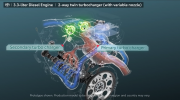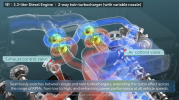Don't use Google Translate.did you actually read the whole article?
It says the 250PS figure is necessary to achieve that lap time. It was not confirmed by Toyota. That's an estimation by the author.
Also the author claims the ICE has an efficiency of 40% but that's not an official number from Toyota. (For reference the tank-to-wheel efficiency of Mirai 1 is 57% and Mirai 2 is 66%).
[Note however, that Morizo (Akio) was indeed surprised by the thermal efficiency of the H2 ICE that far outperformed their expectations]
He also estimates the H2 ICE can achieve same energy efficiency as FC with hybridization, again without any confirmation.
In summary the author made a lot of assumptions and estimations that are NOT confirmed by Toyota. And clearly he lacks the fundamental understanding of why ICE or any other heat engine is so inefficient compared to FC/batteries.
In the beginning the author said according to multiple interviews, H2 ICE is NOT on Toyota's future energy roadmap. But Morizo (Akio) approved a racing program any way, just to see exactly how well will a H2 ICE work. And it outperformed expectations.
Mirai 2's FC is already more efficient than the most efficient heat engine ever made (combined cycle turbines with ~60% efficiency). Electrochemical systems are just more efficient than heat engines period. Anyone with undergraduate thermodynamics course understands that.To my knowledge, a ICE and a FC having similar efficiencies is only possible if Toyota found the holly grail for the ICE or if their FC isn’t that good...
Last edited:



